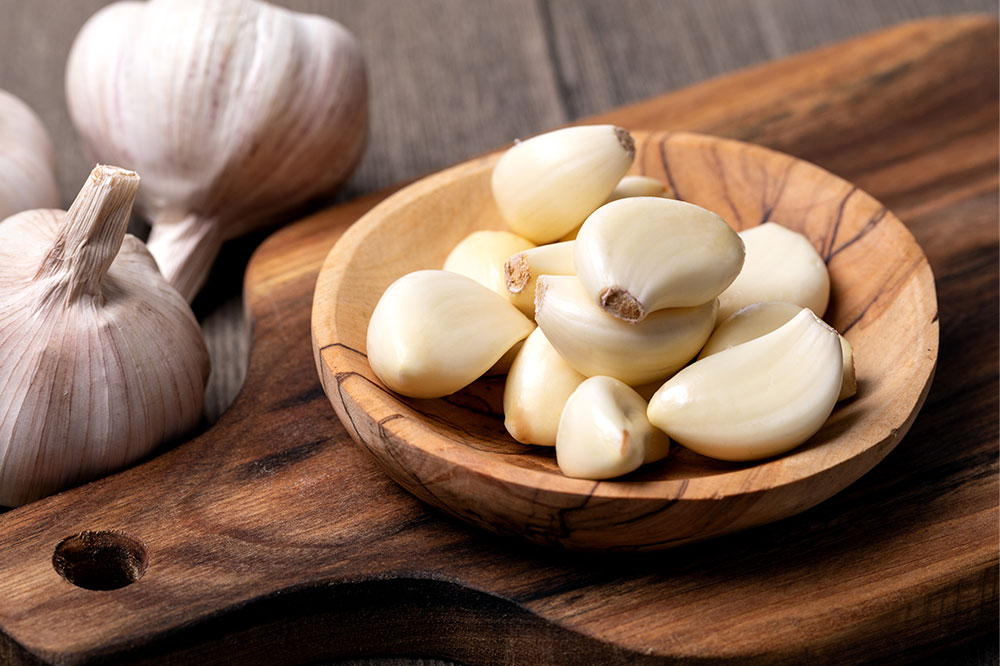12 foods to avoid for hemophilia patients

Hemophilia, a genetic bleeding disorder, requires individuals to be careful about their food choices. Managing hemophilia extends beyond clinical treatments; understanding which foods might exacerbate the condition is paramount. Certain foods, though generally beneficial, can present challenges for those with hemophilia due to their potential to interfere with blood clotting. Thus, individuals must learn about these to avoid adverse effects or worsening of symptoms. Accordingly, here are 12 foods to avoid for hemophilia.
Garlic
Garlic and onions, appreciated for their potential health benefits and ability to elevate foods, inherently contain natural anticoagulant properties. These properties can potentially escalate the risk of bleeding in individuals with hemophilia. While cooking these ingredients can slightly diminish their potency, it remains advisable to consume them in moderation. Both garlic and onions are versatile ingredients, and their flavors can often be imparted in cooking with smaller quantities, allowing for enjoyment without significant risk.
Cranberries
Although celebrated for their benefits for urinary tract health, cranberries can potentially interfere with blood clotting. Individuals with hemophilia are advised to exercise moderation when consuming cranberries and cranberry products, or avoid it altogether. Its consumption, especially at a supplemental level, may lead to an antithrombotic effect, increasing the risk of bleeding.
Almonds
Almonds are a nutritious snack, rich in vitamin E and healthy fats. They are also a good source of protein and fiber. However, foods rich in vitamin E, such as almonds and sunflower seeds, can potentially affect blood clotting. Vitamin E is known for its antioxidant properties, but in higher doses, it can act as a blood thinner. While it’s important to maintain an adequate intake of vitamin E for overall health, individuals with hemophilia should be cautious about excessive consumption of vitamin E-rich foods and supplements.
Fish oil supplements
Fish oil supplements, widely recognized for their health benefits, should be approached with caution and preferably under the guidance of a healthcare provider. Striking a balance between the potential benefits and risks associated with these omega-3 fatty acid sources is crucial.
Spices
Those who have been experiencing prolonged bruising or bleeding in any form must avoid eating spicy foods such as peppers and chili, as they may cause irritation. These foods may also inflame the gastrointestinal tract, worsening hemophilia symptoms. Instead of spices, opt for herbs such as oregano and thyme to flavor food.
Caffeine
Caffeine tends to have a mixed effect on the body. While it may help improve alertness and focus, it can also increase one’s blood pressure temporarily. This may lead to an increased risk of bleeding among those living with hemophilia. According to experts, healthy adults must limit their caffeine consumption to 400 milligrams per day. For more clarity regarding one’s caffeine consumption, speaking to a doctor or healthcare professional is recommended.
Salt
Over time, excessive salt consumption can raise one’s risk of hypertension or high blood pressure, raising the risk of bleeding episodes among people with hemophilia. Among healthy adults, salt consumption must be limited to 2,300 milligrams per day. Salt is a common additive found in ready-to-eat meals, condiments, sauces, and more. Thus, it is essential for one to check the ingredient list carefully before purchasing these food items.
Fatty and fried foods
Fried, processed, and fat-rich foods are known to have a negative effect on people’s health. They lead to fat accumulation around vital organs and joints, and raise the risk of cardiovascular ailments. Among those with hemophilia, this threat is amplified, as it may increase the risk of bleeding due to additional pain, stress, or pressure around the joints. One must opt for foods that are low in fat and cholesterol. Avoiding foods rich in saturated fats such as butter, whole milk, cheese, and processed foods may help one lead a healthier lifestyle.
Papaya
Papaya is a tropical fruit that offers a range of nutrients, including vitamin C, vitamin A, and folate. It is also known for its potential digestive benefits due to the presence of enzymes like papain. That said, these very anti-inflammatory enzymes, bromelain and papain, may increase bleeding tendencies in individuals with hemophilia. It is recommended to consume pineapple and papaya in moderation and to be vigilant for any signs of increased bleeding.
Soy products
Soy products are a valuable source of plant-based protein and contain various essential nutrients. They are versatile ingredients that can be used in a variety of dishes. However, tofu, tempeh, and edamame, being high in phytoestrogens, may act as mild anticoagulants. Individuals with hemophilia may want to consume soy products in moderation and discuss their consumption with their healthcare provider.
Turmeric
Turmeric is a popular spice known for its vibrant color and potential health benefits, including anti-inflammatory properties. It is commonly used in various culinary dishes and can be added to sauces, soups, and beverages. But for individuals with hemophilia, it is important to use turmeric in moderation and seek guidance from their healthcare provider regarding the use of supplements. This is because turmeric contains curcumin, which has mild anticoagulant effects.
Sugar
While not directly related to blood clotting, high-sugar foods may contribute to inflammation and other health issues. Inflammation can exacerbate bleeding tendencies in individuals with hemophilia. It’s advisable to limit the consumption of sugary items for overall health. Sugar-rich foods and beverages can lead to spikes in blood sugar levels and may contribute to inflammation in the body. For individuals with hemophilia, managing inflammation is important to maintain overall health. It is recommended to limit the intake of sugary items and opt for balanced, nutrient-dense alternatives.